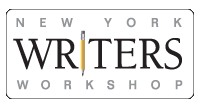Update on WOW! Summer Flash Fiction Contest
Hi Ladies! Many of you have emailed us with the question, "Have you sent out first-round notifications yet?" The answer is: No, we have NOT emailed first-round notifications. We are getting close, though! First-rounders will be notified by the end of this week. From there, we will be going over every entry in detail, and passing them along to our guest judge for the season, literary agent, Elise Capron. Winners will be notified with the November Issue of WOW !Thanks for your patience, and best of luck! Be sure to check out our latest creative essay contest, sponsored by skirt! https://www.wow-womenonwriting.com/contest.phpLabels: WOW Summer 2008 Flash Fiction Contest update
Understanding A Writer
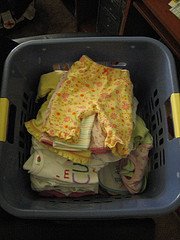 This past weekend, my mom said something funny to me, and I'm wondering how many other writers out there have had similar conversations with loved ones. She was up for a visit--going to attend her 50th high school reunion and staying with me and my husband. She likes to help me out (by the way, I'm an only child), which is extremely nice of her and above and beyond. While she was helping me out this weekend, she said this "funny" thing. I had two baskets of clean laundry sitting in a spare bedroom, and she was folding it for me. She asked me how long it had been in the baskets, and I said about four days. I told her sometimes I don't have time to fold it and put it away; but since it is clean, I just get my clothes out of the basket when I get dressed. Since the basekts are in a spare room, I can just shut the door if company comes over. Her comment to me was. . . "How do you live like that?"
I laughed and said, "There are a lot of writers who 'live' much worse than that." To me, it is perfectly logical to leave clean laundry in a basket, so I can work on my novel or write a blog post. It is perfectly logical to buy Downy Wrinkle Release and spray it on my clothes in the morning instead of spending my writing time ironing. It is okay to leave a few dishes in the sink and not unload the dishwasher yet, so I can interview someone for an article. I am not a slob--I have a clean house, and it is actually pretty neat, but I am a writer--first and foremost, and I can "live like that" because I know what I am passionate about. I know what I need to do each day. I know what is begging to come out of me. It's words and creatvity and stories--not desire to have a perfect house. I am NOT passionate about laundry or dishes, and therefore, I can live like that. I'll just try a little harder when my mom comes to visit. :) The rest of the time, my writing comes before cleaning, that's just the way it is. My husband understands that--thank goodness! Happy Writing, Margo Dill
Publishers Go Green and Give Away Free Digital Magazine Subscriptions
 Did you know that 12 billion magazines are published in the U.S. each year? That's a lot of paper. And although many magazine publishers put out both print and digital editions, the majority of consumers haven't made the switch to digital. Why? Many readers aren't aware they exist. That's why Zinio, the digital magazine vendor, has launched GoReadGreen.com, a website that gives away FREE digital magazine subscriptions to build digital awareness. More than 200 publishers, including Hachette, Wenner Media, and Reader's Digest, have stepped up to the plate to support the initiative. You can subscribe to quality magazines such as Parenting, Saveur, Elle, and Blackbook, for example. There's also Playboy and Penthouse, which have already done well in the digital edition market. ( Hmm...I can't imagine why. LOL.) Here's how it works: Participants can select one FREE One-Year Subscription to the magazine of their choice in Zinio's media-rich format. In addition, when you purchase other publications through the site, a portion of the proceeds from the sales will be used to purchase eco unit credits, to buy more trees. Simple as that. Personally, I think it's great. Digital editions are delivered faster, are interactive, and save the environment. Reading green rocks! Check it out: www.goreadgreen.comLabels: digital magazines, free magazines, free subscription, read green
Putting Yourself Out There As A Writer
By Jill Earl Some time ago, I wrote about the benefits of membership in local writers’ associations, such as attending conferences, becoming part of critique groups, and taking advantage of networking opportunities. It’s the latter that I struggle with. Why? Because it means coming out of my comfort zone big time. Others don’t believe me when I tell them I’m introverted, because I can extrovert when necessary. One friend has said that she’s amazed at how I can ‘work the room’ at gatherings we’ve attended. The fact is, we writers must put ourselves out there to let the world know we exist. How else will they learn about us and our work, read what we produce, hear our voices? Later tonight, I’ll help man the Maryland Writers’ Association (MWA) booth at my favorite September event, the Baltimore Book Festival. Along with fellow members, I’ll spend a few hours chatting up the organization with festival-goers and share my experiences with MWA. Afterwards, I’ll slip into the crowd to enjoy my yearly book festival fix. It's another chance to learn how to network effectively and well, a necessary skill in the writing life. And I enjoy meeting new people. Can you relate? If so, what are some ways you’ve dealt with putting yourself out there? I’d love to hear from you. Labels: Jill Earl, networking, writing life
Quote Starters
-794641.jpg) When you're not sure what to write about, pondering a quotation can be a useful way to get started. The easiest thing to do is pick a quote you like and let yourself freewrite for ten or fifteen minutes. When you're done, you'll probably find the makings of an essay, article, or short story! Below are some quotes you can use to spark your writing. Take a serious or a humorous approach with your response, whatever you prefer. I can envision some good stuff coming from any one of them. For fun, try picking a number between one and ten, then doing a timed freewrite based on the corresponding numbered quote below. 1. "The only normal people are the ones you don’t know very well." -Joe Ancis 2. "The lowest ebb is the turn of the tide." –Henry Wadsworth Longfellow 3. "If you have a job without aggravations, you don’t have a job." -Malcom Forbes 4. "There is no such thing as 'fun for the whole family'." -Jerry Seinfeld 5. "The beginning is always today." -Mary Wollstonecraft Shelley 6. "Keep your eyes wide open before marriage, half shut afterwards." -Benjamin Franklin 7. "Housework can't kill you, but why take a chance?" -Phyllis Diller 8. "Ever notice that 'What the hell' is always the right decision?" -Marilyn Monroe 9. "You may have to fight a battle more than once to win it." –Margaret Thatcher 10. "Only time can heal your broken heart, just as only time can heal his broken arms and legs." -Miss Piggy --MP*image courtesy of tomswift46, flickr.com Labels: freewriting, Inspiration, Marcia Peterson, quotations, writer inspiration, Writers Block, writing, writing practice, writing prompts
Volunteering Your Time and Your Talents
I have a tendency to volunteer to help others free of charge, and then be confused by other people saying “you should request payment,” especially when it comes to proofreading. I don’t see green or dollar signs or it as an imposition on my time. Instead, I see a chance to do something I like, and an experience to be exposed to a different writing style than my own. Yes, I sometimes forsake my work and writing to squeeze in more opportunities to read other people’s material than I ought to, but it got me thinking. How often do we female writers use our natural talents for activities such as volunteering to proofread a colleague’s work or writing for a non-profit organization’s newsletter without payment? Yes, our writing and editing skills could bring us money and fame (so we could hope!), but they could also be the tools that help us bring about change (i.e., if we write letters to the editor), and that could, well, help others. This could even take as little time as playing word games at sites like www.freerice.com. As writers, we often times possess a strong vocabulary repertoire, so why not put it to good use? My workplace supervisor had passed this link along to me. By playing a game with words involved, we are helping a charity collect donations to help others. If you don’t have the time to proofread someone’s manuscript, do you at least have a few minutes to still help using your writing skill set?
Newspaper Writing: Not So Boring and Good For Your Craft
I have posted before about being a stringer for your hometown newspaper. I am actually called a news correspondent, and not a stringer, but it is the same thing. Whenever I tell people I write for The News-Gazette, they will always ask, "What kinds of things do you write?" I say, "Oh, school board and village board meetings. Human interest stories, stuff like that." And there is always a pause with a comment such as, "Oh, how exciting." Actually, I love it. If you are thinking about places to find regular writing jobs, turn to your newspaper. Here's three reasons why I love this job. 1 . It teaches me to focus my writing. When I go to school or village board meetings or I cover an event such as a farmer's market or Humane Society garage sale, there 's a lot of stuff going on that I don't have the space to write about. I have to think like this: "What would a taxpayer want to know about the meeting?" or "If someone was going to this event, what would they definitely need to know?" or even "What would get people to come to this event or meeting if they've never been before?" When I ask myself questions like these, it helps me to pick the details I need to include in my article and helps me to write an interesting opening paragraph. 2. It helps me with my interview skills. Newspaper articles need facts and quotes. In order to get facts and quotes, I have to talk to people. Many times, I will have to call people I don't know, identify myself as being from the newspaper, and ask questions. Sometimes, people don't want to talk to newspaper reporters, even at the most innocent places. When I was covering a farmer's market in a small town, I had the hardest time trying to find ONE person to give me a quote about why he or she came to the market and why other people should, too. I couldn't believe it. I just kept smiling and asking until I found someone willing to talk to me. Other times, people are more than happy to talk to you, especially if it is to celebrate a victory or report on something they are passionate about. 3. It helps me meet deadlines. When I cover a meeting, I go to the meeting that night, come home, and write the article by 10:00 p.m. I have to be fast, accurate, and reliable. I know how to write to deadline. I know how to produce copy quickly. Before taking this job, I would have never believed that I could write something suitable for print in an hour or two, but now I do it at least twice a month. I have learned how to take notes and prioritize stories during the meeting and as I am driving home. These skills help me to meet my deadlines. Sure, I'm not covering any huge stories--the regular reporters do that. But I've covered things like a baby reindeer's recovery at a reindeer ranch and a WWII veteran who finally received his high school diploma. These are fun stories. Just think about newspaper writing if you are looking for an income from your writing and ways to improve your craft! Happy Writing, Margo Dill www.margodill.comRead These Books and Use Them blog--https://margodill.com/blog/
The TMI Dilemma
by LuAnn Schindler"I can't think of anything to write!" When I taught English and would have classes free write, at least one student would utter those words to me. "Well, write what you just said a few times, and eventually, an idea will sprout in your mind," I would tell them. "How can you have difficulty finding something to write about?" I've never had that problem. When I wake up, hundreds of ideas jog through my mind, each elbowing the other out of the way, competing for the top spot in my writing priorities. Yes, I suffer from the TMI Dilemma - too many ideas. I've talked about this before. My desk is plastered with Post-It notes filled with ideas. My idea file needs to go on a diet, a purge that will result in a delicious payback for me. If you, like me, are afflicted by the too many ideas dilemma, here are some strategies to help you focus on the cream of the crop: - Ideas, like fine wine, get better with age. Some need to age and develop a pleasing bouquet before you pop the cork and share it with the world. I've had a short story idea drifting around in my mind for two years. Each day, the details become a little more clear to me, and when the time is right, the cork will pop! And, I'll write the short story I am meant to tell.
- Deadlines are key. Even if you don't have a deadline, give yourself one. Even a timed free write can bring the best ideas to the front.
- Mind the brain. When ideas are swirling, stir them and see what floats to the top. That is the best idea to focus on.
- Organization is open to visualization. On my office door, I have a list of articles that are due, along with the due date. By keeping these projects in front of my eyes, I am able to stay organized and on task.
- A network of writer friends, or even friends who are creative thinkers, allows you to bounce ideas off them. Whether you join a critique group or just share an idea with a friend, they'll be honest with you. In the long run, your writing will be better, too.
- Exercise the right to exorcise. I'm responsible for mowing our acreage. During that time, not only do I walk and get a great walking workout, but I also focus on an idea and flesh out details. If something isn't working with a story line or article idea, I exorcise the idea and start over. It works!
If you suffer from the TMI dilemma, try one of these ideas for fast relief and a clear writing path. Labels: focusing, getting ideas, LuAnn Schindler, narrowing ideas
Add A 'Nudge' to Your Writing Life
By Jill Earl I don’t know about you, but sometimes I need just the right ‘nudge’ to get me going when it comes to my writing life. One time, I might need an idea for an article I'm working on. Another time, I may be pondering the best way to market myself. Yet another time, I may need some guidance on networking. Turning to a writing coach or mentor would be ideal, but what if you don’t have access to one? ‘The Morning Nudge’ might be the answer for you. Created by freelance writer and writing coach Suzanne Lieurance, ‘The Morning Nudge’ delivers advice and inspiration to your inbox to help your career. I like the variety of emails I receive and I can count on being motivated to focus on one area of writing each day. For instance, the May 13th email, ‘Read To Become A Better Writer’, suggested taking at least 30 minutes out of the day to read something of interest to you and read the types of materials that you wish to write, two things I already do. And if you want to keep being paid for your writing, the April 9th email points out that you need to be either looking for or completing freelance writing jobs all the time. I can use some work in that area. There are other times when an email prompts you to pull out paper or laptop to set up goals for the near future. Just some simple ways to keep the momentum going in your writing career. Interested? Get ‘The Morning Nudge’ at https://www.workingwriterscoach.com/ Because, sometimes, we all need just the right nudge in our writing. Labels: Jill Earl, Suzanne Lieurance, The Morning Nudge, writing inspiration
Word Trivia
 Most writers love words and language. Some of us have even been known to (occasionally) read the dictionary for fun! If you're a word geek too, see if you can figure out the answers to the questions below. 1. What are the only two English words to end in the letters –ngry? 2. What is the English word that, when all its letters are capitalized, comes out the same backward, forward and upside down? 3. Come up with the shortest English word that contains each of the first six letters of the alphabet. 4. What common word uses each of the five vowels, plus y, in their proper order? 5. What's the longest English word that uses only one vowel? Answers: 1. angry and hungry 2. NOON 3. feedback 4. facetiously 5. strength Questions selected from The Great American Bathroom BookPhoto courtesy of togr at flickr.com Labels: fun, Marcia Peterson, Words
The Slush Pile: Can We Get Out?
Nobody wants to be in the slush pile, but when you are starting out in the world of trying-to-get- a-book-published, you might just wind up there. In today's technology age with ANYONE being able to easily type up a manuscript on his computer and send it out, publishers', and some agents', slush piles are growing bigger and taller as we read and type. So, what can we do to help get out of slush piles and on to book shelves? 1. Find an agent. Okay, I know this is not easy to do, but agents generally have less of a slush pile, and I'm not sure why--maybe someone out there knows. Just follow the guidelines of each agency carefully. If they only want a one-page query, then only send a one-page query, even if you think it doesn't capture the true essence of your book or your project. Most won't even read your submission if you don't follow the guidelines. An agent is helpful for staying out of the slush pile because he or she knows editors, already has built relationships with them, and keeps up on the constant staff changes in the publishing world. 2. Go to conferences. If you can afford to go to a large conference where there are several agents or editors speaking, GO! Most of these speakers are looking to acquire new talent, and they will take unsolicited submissions from conference attendees for a period of time after the conference. Some will give you a key word to write on your envelope, so don't just pretend you went to a conference and send your manuscript in. You could easily be found out. Any opportunity you can find to meet agents and editors face-to-face is a great way to stay out of their slush piles. 3. Use your friends, contacts, and networks. Don't really "use" them in the old high school sense, but ask your published friends and contacts if they could recommend you to their agents or editors. This doesn't mean you automatically will get published because you know the right person, but it helps you to get your foot in the door and your envelope on the stack of mail that will be opened in a month, instead of in six months. If you don't manage to get out of the slush pile. . .Don't stress out. There are success stories throughout the publishing world of authors being plucked from the pile of unknowns and making it to the bestseller list. Just keep your eyes open for opportunities that will get you a little closer to the bookshelf. Of course, there's always hard work and good writing that needs to come, too! :) Happy Writing, Margo Dill www.margodill.commargodill.com/blog/--Read These Books and Use Them!
WOW! Women On Writing Fall 2008 Essay Contest Sponsored by skirt!
WOW ! Women On Writing announces the new Fall 2008 Essay Contest, sponsored by skirt! books. We've raised the word count to give you more words to tell a compelling story. We've also put a limit on the number of entries, so be sure to get your submissions in early for inclusion. Word Count: up to 750 wordsDeadline: November 30, 2008 The contest may close early if we reach 300 entries. Prompt: This season’s prompt is inspired by Jill Butler’s book, Create the Space You Deserve: An Artistic Journey to Expressing Yourself Through Your Home. Jill offers a favorite quote from Winston Churchill: “We create our dwelling and afterwards our dwellings create us.” Jill believes it runs both ways simultaneously. As we create ourselves, we create our homes, and in the creating of our homes we have the opportunity to recreate ourselves. In less than 750 words, tell us how recreating your personal space has changed your life, or how by making changes in your life, it has moved you to express yourself and recreate your home. These can be personal stories of love, loss, moving to a new area, or anything that has affected or inspired you to recreate your life and your home. Guest Judge: Literary Agent, Jennifer DeChiara, of The Jennifer DeChiara Literary AgencyJennifer was the guest judge for last year's Summer 2007 Flash Fiction Contest. We also interviewed Jennifer in WOW !'s November Walking in an Agent's Shoes issue. Entry Fee: $10 per entry Entry Fee Plus Critique: $20 per entry. Yes, you heard it right, due to popular demand, we added the critique option once again! We have critiquers ready to go, so it won't hold up the results of this contest. Limit: 300 entries Prizes: 35 Winners total! 1st Place: $200 cash prize; skirt! Books Goodie Bag (worth over $50 per goodie bag) including 3 books; entry published on WOW !, a year's subscription to Premium-Green Writer's Markets ($48 value); interview on The Muffin. 2nd Place: $150 cash prize; skirt! Books Goodie Bag (worth over $50 per goodie bag) including 3 books; entry published on WOW !, a year's subscription to Premium-Green Writer's Markets ($48 value); interview on The Muffin. 3rd Place: $100 cash prize; skirt! Books Goodie Bag (worth over $50 per goodie bag) including 3 books; entry published on WOW !, a year's subscription to Premium-Green Writer's Markets ($48 value); interview on The Muffin. 7 Runners Up: skirt! Books Goodie Bag (worth over $50 per goodie bag) including 3 books; entry published on WOW !, a year's subscription to Premium-Green Writer's Markets ($48 value); interview on The Muffin. 25 Honorable Mentions: skirt! Books Goodie Bag (worth over $50 per goodie bag) including 3 books; name, title of story, and city/state published on WOW !Find out full details by visiting our contest page: https://www.wow-womenonwriting.com/contest.phpBe sure to download the free ebook of terms & conditions, as well as FAQs on our contest page. Labels: essay contest, Jennifer DeChiara, skirt books contest, Women On Writing Fall 2008 essay contest, writing competition
Growing Your Editorial Business--Safely!
Doing well and in a hurry to grow your writing or editing business? Be careful. If you don't steer it in the right direction, your business can run into all kinds of problems. Small business consultants such as Inc. magazine's Rhonda Abrams offer several warnings: 1. Know what business you're in. What do your clients look to you to provide? What are you best at doing? Independent writers and editors today can go in all sorts of directions -- Web content provider, Web editing, copy editing, proofreading, ghostwriting, bookseller, book publisher, copywriter, marketing consultant, and even more. It can be difficult to narrow it down, but doing so can help you make marketing and overall planning decisions. 2. Concentrate on your core business first. Which activities actually bring in the money that pays your bills? Which clients or publications or subject areas comprise your core business? Take care of them first before expanding into other fields or markets. 3. Don't bet all your money on one horse. Over the years, our Network has seen several members run into trouble because a single client or publisher brought in most of their income -- then that client folded or moved on to other writers. Being dependent on one or two revenue streams is perilous, according to Abrams. If you're currently in this situation, make adding new revenue streams a top priority as you begin planning for 2009. ----- Source: Writers-Editors eZine, Sign up for a complimentary subscription at https://www.writers-editors.com. WOW ! interviewed the founder of writers-editors, Dana K. Cassell, in our March Issue--see it here: https://www.wow-womenonwriting.com/7-review.phpLabels: Dana Cassell, editorial business, freelance editing, writers-editors
Free eBook Manifestos!
 If you haven't heard of ChangeThis, you should definitely check it out. It's great on so many levels. If you are an author looking to promote your book, you should consider submitting a proposal for a manifesto to buzz your book. If you are someone like me, who simply enjoys free ebooks, then you'll delight in the variety of topics the ChangeThis e-books provide. They're not your typical run of the mill stuff. Yes, they are fairly short, about 5-18 pages, but they are chockfull of information/arguments presented in a gorgeous package. The designers are awesome! I can see why they get a lot of proposals. ChangeThis encourages readers to pass it on. Their manifesto states they don't have a business model. Their goal isn't to make money. They state, "The goal is to make a difference." And, I think they are doing just that. Here are three of my Manifesto picks! You can download them right here, see if you like them, and then head over to ChangeThis to pick up some more. Sign up for their newsletter and they'll notify you when new ones come out. -------------- 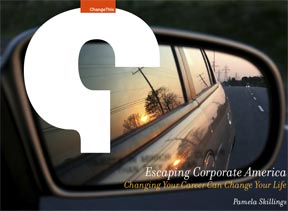 Escaping Corporate America Escaping Corporate AmericaChanging Your Career Can Change Your Life By Pamela SkillingsIf you're like most Americans, you're going to spend more than 100,000 hours at work over the course of your lifetime. That’s probably more time than you'll spend with your best friend, the love of your life, or your cherished offspring. So, wouldn't it be a shame to waste the majority of those hours on work that annoys you or, even worse, makes you downright miserable?This Is Not My Beautiful LifeOver the years, I've talked to a lot of disgruntled corporate employees. I worked in the corporate trenches myself for more than a decade and spent several more years interviewing and coaching corporate escapees. I've learned that people tend to stay stuck in jobs that don't inspire them for one of five common reasons (and sometimes it's a combination of a few). Do any of these scenarios ring a bell for you? You believe that it isn't possible to actually love your work.Some of us have been taught, by conservative parents or disapproving guidance counselors, that jobs are strictly ways to earn money. You're not supposed to enjoy your time in the salt mines, really. As a result, you may have ended up in a career that looked good on paper, but offers little fulfillment. You're not sure what you want to do with your life.For many of us, our careers just sort of happened. We took a "temporary" gig until we could figure out what we wanted to do for our "real" careers. Then, we woke up years later to realize that we were stuck in careers and lives that we never planned or wanted. You're having a mid-career crisis.Maybe you once loved your career, but the thrill is gone. You've stopped learning and growing, lost interest in your current field, or are otherwise ready to move on. But you're afraid to take a chance on something new--or you're confused about which direction to take from here. You're too busy working to make time for a career change.If one of your complaints is that your job is overly demanding, it can be difficult to carve out enough time to eat and sleep, let alone start working toward a new career. Instead, it can be tempting to put off change until some imagined day when you will magically have plenty of time. It's all about the money.There is no shame in caring about money. We all need money to live--some more than others. It isn't shallow to enjoy what money can buy. We all have different priorities and different ideas of what makes life good. You may value a high salary because it gives you the ability to put your kids through college, support your favorite charities, or just take nice vacations and see the world. The problem comes when you trade too much for a high salary. There are ways to make money that don't require selling your soul.
Did any of these ring a bell? Download the solutions and the full ebook here. -------------- Mini Sagas: Bite Sized Lessons For Life and BusinessBy Rajesh Setty I love this! Both visual and inspirational. Each story is comprised of 50 words with a picture. I love the tight word limit. What a great exercise! We should do our own mini-sagas sometime. In this photographic manifesto (the first in ChangeThis history) Rajesh Setty has compiled 15 mini sagas from his collection. Each 50 word story is packed with a lesson on life and/or business. 
#13 The Missing PieceI was at a writers' conference earlier this week. The moderator asked for people to list their expectations from the conference. The expectations ranged from wanting to sell more books to building a good network. What was strikingly missing was that nobody said "I want to become a better writer."  #10 Lost #10 LostBob was totally lost. He was frustrated. His problem was simple. He couldn't figure out where exactly he was. Naturally, he was clueless on the direction or the distance of his destination. After struggling a bit, Bog realized what the real problem was--he was carrying the wrong map! 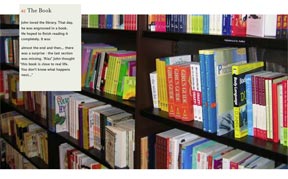 #2 The Book #2 The BookJohn loved the library. That day, he was engrossed in a book. He hoped to finish reading it completely. It was almost the end, and then...there was a surprise--the last section was missing. Alas, John thought, this book is close to real life. You don't know what happens next... Okay, while you can tell the guy that wrote this book isn't exactly a writer, I love the concept, and the design. A photo-journal, or "mini-saga," as he calls it. Super idea. I'd love to see more of this! Click to download the full ebook manifesto here. -------------- 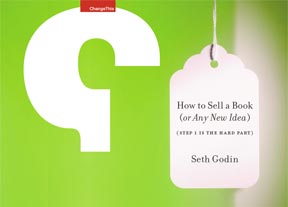 How to Sell a Book (or Any New Idea) How to Sell a Book (or Any New Idea)(STEP 1 IS THE HARD PART) By Seth Godin My friend Fred has a new book coming out and he was trolling around for new marketing ideas. I think he’d be surprised at this: Sell one. Find one person who trusts you and sell him a copy. Does he love it? Is he excited about it? Excited enough to tell ten friends because it helps them, not because it helps you? Tribes grow when people recruit other people. That’s how ideas spread as well. They don’t do it for you, of course. They do it for each other. Leadership is the art of giving people a platform for spreading ideas that work. If Fred’s book spreads, then he’s off to a great start. If it doesn’t, he needs a new book. You don’t get to take step 2 if you can’t do step 1.
Click here to download Seth Godin's latest manifesto.
-------------- These are just a sample of some of my picks. I haven't had time to read them all--there's quite a lot! If you are an author and want to submit a proposal, follow this link: https://changethis.com/submit. If you just want to see what's available for download, go to: https://www.changethis.comWhat a fun find! Labels: 50 word stories, changethis, ebook, escaping corporate america, free ebooks, how to sell a book, manifesto, mini-sagas, seth godin
Running - and Writing - in a Circle
by LuAnn SchindlerThere are days when a situation presents itself and we feel overwhelmed, unsure of what direction to take. We're running in a circle to accomplish the daily to-do list or running around trying to focus on too many things at once. It's the same way with writing. Sometimes, the words on the page seem like they are in a circular motion, trying to form a connection that simply doesn't exist. A good exercise I like to use to get the total connection is in the book The Write-Brain Workbook: 366 Exercises to Liberate Your Writing by Bonnie Neubauer. It's called the Circle Game. Write these three lists of words on a piece of paper: Alabama Banister Carousel Diesel Exorcist Flatulence Garage Harried Insensitive Jambalaya Keepsake Lamb Massage Nonsense Oriole Now, circle one word in each line. The next step is to create a story incorporating these words. The first line of your work will be: Sometimes I feel just like a gerbil, running around and around on his wheel.When you're writing, it's important to make the connection. Circular writing and thinking ties the elements together, allowing readers to follow the path the writer is traveling. Circular thinking is a good thing, a positive step in linking words, items, people, places together. Use the running around exercise to expand your circle of knowledge. Exercise reprinted from The Write-Brain Exercise: 366 Exercises to Liberate Your Writing by Bonnie Neubauer. Copyright 2006.Labels: circular thinking, LuAnn Schindler, writing prompt
The Writer's Chatroom: More Than Just Small Talk
By Jill Earl You’ve got to love the logo at the upper left corner of their homepage: a figure repeatedly banging its head against a computer keyboard! What writer can’t relate to that image? This is home to The Writer’s Chatroom (TWC), a Writer’s digest ‘101 Best Websites for Writers’ winner. Editor Audrey Shaffer and the rest of the TWC crew consistently provide a variety of resources that support and encourage writers of all genres and levels of experience. I’ve been exploring the site for a while and definitely like what I’ve seen. Following are some of TWC’s features. Celebrity SundaysThis is where to come for the week’s spotlighted writer at 7 PM EST. Scheduled guests include everyone from up-and-coming to more noted authors and others from the writing and publishing world. This chat is moderated so attendees get the most out of this time. Open to all, simply choose a username and click on the login button to join in. Past guests have included Jenna Glatzer, Lea Schizas, C. Hope Clark and ‘Renegade Writer’ Diana Burrell and Linda Formachelli. Open Chat WednesdaysFor a more informal chance to interact with fellow writers, join this unmoderated chat running from 8 to 11 PM EST, where any topic is up for grabs. The ForumJump in to read posts, add comments, or start your own thread. Great networking opportunity. Writers Chatroom blogThis is the discussion blog for TWC members. https://www.writerschatroom.com/blog.htm‘The Bold and The Italics’
Did you know that TWC has its own soap opera? This recent addition to the site’s forum offers a peek into the ‘sordid lives’ of TWC participants. Check it out for yourself at https://www.writerschatroom.com/forum/Four ‘episodes’ have been posted so far, and they’re such fun! A soap about writers, how cool is that? TWC NewsletterYou’ll want to sign up for this so you won’t miss useful articles, upcoming chats and other announcements. It comes out at the beginning of the month and features a letter from Audrey herself. So if you’re looking for a one-stop site for writers, check The Writer’s Chatroom at https://www.writerschatroom.com/It’s more than just small talk. Labels: Jill Earl, The Writer's Chatroom, writing resources
Ten Ways To Get Cheap (Or Free) Magazine Samples
 Aside from being fun to read, we as writers need to study the publications we're trying to break into. I've gotten loads of cheap magazine subscriptions through various online discount sites, and even ebay. Here are some additional ways to obtain the magazines you're interested in, from freelancer Pam White. Aside from being fun to read, we as writers need to study the publications we're trying to break into. I've gotten loads of cheap magazine subscriptions through various online discount sites, and even ebay. Here are some additional ways to obtain the magazines you're interested in, from freelancer Pam White.
--MP1 - Join a reading or writing group. Ask members to bring in their already-read magazines and have an exchange. Do the same with interest groups you belong to or know about - playgroups (parenting, home, cooking, family mags), business networking groups (entrepreneurs, home business, finances magazines), church (religious, devotional periodicals). 2 - Offer to take a friend to the doctor’s office. Okay, that sounds goofy but I love taking my children to the orthodontist, pediatrician, and dentist offices so I can scan the table of contents and skim the articles in the parenting, children’s, family, travel and money magazines. I bring a notepad and take plenty of notes. Find an article in an old magazine that would help your research? Ask the office to make a copy of it; offer to pay. 3 - Subscribe. Remember if you subscribe to a magazine that is for business purposes, you can deduct the cost of the subscriptions if you itemize your taxes. I am a food writer so I keep all receipts for food and writing magazines, and food and writing books to deduct as business expenses. 4 - Take up publishers on their free copy offers. It used to be that all magazines would let your send in a postcard and check the "bill me" square and you’d end up with two or three issues before they cut you off for not paying. These days, we cannot even be inadvertently dishonest. I get mailings from magazines offering me one free issue. I will send in the postcard and usually have a bill to pay before I’ve read the free issue. I then can decide to subscribe or put the bill in the postage paid envelope and decline to pay. 5 - Look for the online issues of particular magazines. It’s true that many use original content online (another good market to explore) but even the different content will show you what type of material the magazine is looking for. 6 - Read newspapers online. Do you want to write travel articles? Visit the major newspapers online. Most hire freelancers to cover a great deal of their special interest articles. Contact information for, in this example, the travel section editor will likely be available on the website. 7 - Write for guidelines. Look in The Writer’s Market. If you are looking for parenting magazines and find one that sounds about right to you but you’ve never seen, write for the writer’s guidelines and request a sample issue. Double check the listing of the magazine to see if there is a reduced price or you have to send a stamped envelope to receive a free copy. 8 - Go to the library. This is so obvious! Make a bi-weekly appointment to go to the library and review the magazines you want to write for. Make notes. Use the library’s copier to photocopy the table of contents, or an article or two to review at home. 9 - If your public library doesn’t carry the magazines you want to know about, travel to a college library. They are set up for your kind of research. While most require student identification to use the reference materials, you can read the periodicals unimpeded. 10 - Bookstores! Grab a pile of magazines, buy that over-priced latte and carefully review the magazines you’ve found to study (remember, if you spill on it, you buy it!) (c) Pamela White, 2006 About the author: Pamela White published Food Writing, the free ezine for food writers from her website: www.food-writing.com She teaches food writing classes, and her book, Make Money as a Food Writer in Six Lessons, is available at Amazon.com. Photo courtesy of PinkMoose, flickr.com Labels: freelance writing for magazines, magazines, Marcia Peterson, pam white
Writing the Well-rounded Profile
by LuAnn SchindlerSince I freelance for a regional newspaper, quite a few of my pieces fall under the 'profile' umbrella. Sometimes, the information is easily molded into a non-fiction creation that presents the facts: introduce person, explain why he / she is important or why he / she is an interesting profile, conclude with a call to action or at the very least, a memorable quote. But sometimes, profiles written in that manner tend to become boring and the writing seems stilted. Here are some ideas to break out of the auto-pilot profile mode and create memorable stories. - Research, Research, Research: Don't simply interview the profile subject. Interview others who interact with her on a regular basis. By interviewing more than one source, writers gain a new perspective that can show the many nuances of a person's character, work ethic, emotions, etc. Thorough research results in a well-crafted article. An sometimes, the research can lead itself to an article for a new market.
- Cut the Chronology: Great profiles don't begin at a person's birth and end with what the person is currently involved in. Great profiles alternate between the past and present and build the bridge of importance between the two.
- Honesty is the Best Policy: Be polite, but be honest. While the world is everyone's stage, not everyone always shows his or her true self. Sometimes, showing someone's downfall(s)makes a subject appear more human than he or otherwise would have.
- Find a Common Bond: Create an emotional bond between the subject and the reader by discovering and showing the common bond. It's there. Just simply a matter of finding it. :)
There are also several writing habits to avoid when writing a profile. - Avoid inserting too much about yourself into the profile. It's not about you. It's about someone else.
- Avoid flowery descriptions that don't add to the storytelling.
- Avoid using large segments of quotations from the subject. Set the mood by weaving minimal description and paraphrasing.
- Avoid not focusing on a point or revealing something about the subject. If there isn't a point, who will read it? Show why this person is interesting!
If you use these techniques the next time you pen a profile, you'll take the basic profile form from ordinary to outrageous! Plus, you'll give a balanced, well-rounded glimpse into a person's life. Labels: interviews, LuAnn Schindler, profiles
Library Card Sign-Up Month Is Here
By Jill Earl Did you know that the arrival of September not only brings fall and a new school year, it also brings Library Card Sign-Up Month? The American Library Association (ALA) and libraries nationwide want to spread awareness of the vital role libraries and books have in the development of a child, enhancing learning and ensuring that everyone has access to the information available at these treasured places. For 2008, NBA great and author Kareem Abdul-Jabbar is honorary chair for Library Card Sign-Up Month and has his own READ poster. In a quote appearing on the event’s webpage, Jabbar stated, “The library has always been my own personal time machine. I can walk through the doors and land in any place, any time period in history. I didn’t have to wonder what their worlds were like; I could experience it first hand.” Takes me back to my first library card. I could hardly contain myself after receiving it and dashed off to make my selections. From then on, visits to the neighborhood branch with my mother---and as I grew older---by myself, were the norm, and a lifetime love of books and libraries was born. I read just about everything I could get my hands on. History, the sciences, novels, geography, poetry, plays, you name it. Sure, you can find practically anything on the Internet, and I appreciate that convenience, but there's something so satisfying about the feel of a book in your hands. I remember one incident where I was able to pass on the importance of owning a library card and my love of books to children. I spent two summers after high school graduation working at my former elementary school’s summer reading camp as a junior counselor. My respect for teachers increased dramatically as we created lesson plans emphasizing reading and writing for children ranging in age from 6-12 years old, in a community where books and reading weren’t valued. The school’s library was a welcomed resource to us counselors, but it also gave me ‘street cred’ with the kids, as they discovered the variety of books I’d taken out when I was a student there and checked them out themselves. Perhaps those kids managed to convince their parents to make a trip to their local library to get a library card. Maybe their guardian was inspired to get their GED so they could read to their child at night. Did my love of reading help develop a lifetime love of reading in some of those children? I’d like to think so. I make the effort to visit my neighborhood library once a week, spending a few hours working on my laptop and browsing the stacks. I’ll fit in a trip to a bookstore a couple of times a month, too. Both are such a part of me that when I don’t do them, it feels like something’s missing in my life. So, what can you do to help celebrate with your child and get the word out about Library Card Sign-Up Month? Some resources are included below. I Love Libraries.org https://www.ilovelibraries.org/librarycard/index.cfm 1) Make your own READ mini-poster. 2) Check out the recommended book lists from the Association for Library Service to Children. 3) Check out Kareem Abdul-Jabbar’s website and blog for his interview with I Love Libraries. About.com: Family Crafts site https://familycrafts.about.com/library/spdays/blseptmon2.htm Takes you to Sherri Osborn’s page with ideas to help celebrate, such as making your own books and bookmarks, with more links to other book-related activities. Maybe you can pair the above activities with a related September observance, Read A New Book Month. The library card. Can’t think of a better way to open children’s imaginations and introduce them to the world. Labels: Jill Earl, libraries, Library Card Sign-Up Month, reading
10 Easy Ways to Reduce Stress
Stress is basically a disconnection from the earth, a forgetting of the breath. Stress is an ignorant state. It believes that everything is an emergency. Nothing is that important. Just lie down. - Natalie Goldberg My husband suffers from migraines and his neurologist once gave him, along with a prescription for Topomax, a brochure called Headache Help. Inside, there’s a section with a list of “proven stress reducers.” Now, for a women’s magazine junkie like myself, there were plenty of things on the list that made me go, “Duh!” Like: prepare for the morning the evening before; get enough sleep; take a hot bath to relieve tension. But the list had some surprisingly interesting ideas as well. Here are ten that I liked: 1. Relax your standards. The world will not end if the grass doesn’t get mowed this weekend. [my note: substitute vacuuming, laundry, or whatever for lawn mowing.] 2. For every one thing that goes wrong, there are probably 10, 50 or 100 blessings. Count them! 3. Everyday, do something that you really enjoy. 4. Focus on understanding rather than on being understood; on loving rather than being loved. 5. Do something that will improve your appearance. Looking better can help you feel better. 6. Become more flexible. Some things are worth not doing perfectly and some issues are well to compromise on. 7. If an especially unpleasant task faces you, do it early in the day and get it over with; then the rest of the day will be free of anxiety. 8. Have a forgiving view of events and people. Accept the fact that we live in an imperfect world. 9. Have an optimistic view of the world. Believe that most people are doing the best that they can. 10. Do one thing at a time. When you are with someone, be with that person and with no one or nothing else. When you are busy with a project, concentrate on doing that project and forget about everything else that you have to do. Do any of those hit home for you? --MPLabels: managing stress, Marcia Peterson, natalie goldberg
Workshop Event: Now Get Published!
Discover the Secrets to Landing a Book DealJoin New York publishing insider JOEL FOTINOS, Publisher Tarcher/Penguin and Director of Religious Publishing, Penguin Group (USA) Inc, and publisher of The Artist’s Way, LAURA BREMAN, best-selling author of Now What? 90 Days to a New Life Direction, featured on Oprah, The CBS Early Show, NBC's Weekend Today, MSNBC, CNBC,CNN and many others, and JAMES NAVÉ, acclaimed poet and co-founder of The Imaginative Storm Writing Salon for a hands-on, intensive one-day workshop that will provide the tools you need to get published now! September 27, 20089:30 - 6:00 p.m. The Sacred Center 330 West 38th St. New York, NY Don't miss this unique chance to get insider information and advice on:
• The #1 secret to landing a great book deal • The top 10 mistakes authors make • Promotional platforms that attract major publishers • Proven techniques to keep you creative and motivated • Three sure-fire ways to connect with your audience • How to create powerful marketing materials and web copy • The final word-when to let go • When you need an agent • The pros and cons of self-publishing • How to build strong relationships with publishers and professionals who can help you succeed.
Registration is limited! Early Bird Tuition is available if paid before September 12 ($129)
Find out more, and register early!
www.thewritingsalon.net/assets/salon_tarcher.html 1-877-994-8267 outside US: +1-919-949-2113
Labels: Event, Now Get Published, secrets to landing a book deal, writer's workshop
Dastardly Dialogue Tags
At my critique group, we often talk about dialogue tags. Why are these tags so often a topic of conversation? Because they cause so many of us fiction writers huge problems. I also have seen this topic mentioned again and again in writers' handbooks, so it must be a problem for more than just the six of us at my critique group. Here are some of the points we touch on. 1. You can just use "said." One of the writers in our group doesn't believe this, but it really is true. Your characters don't need to exclaim or shout or cry or any of those things that characters did in classic novels. Today, it is okay to just use said. I don't know if this next fact has been scientifically proven, but supposedly, the reader's eyes just glance over the word said and don't notice the repetition. So, Bill said, "Your house is on fire!" I hear him shouting in my head, do you? Wait, I didn't even see that said. . . 2. You don't always need a dialogue tag. Now, the younger the reader, the more dialogue tags you probably need. This isn't saying anything about the intelligence of the reader. We all know that there are some genius fourth-grade readers out there. But as a general rule, if you are writing an early chapter book, you probably want to provide a dialogue tag almost every time. If you are writing for adults, you only need them to set a scene or occasionally for the reader to keep track of who is talking, so he or she can stay in the story and not have to figure out who is talking. 3. Dialogue tags should be used to set the scene, provide sensory details, and character description. Here is your chance to slyly let readers know what is going on while they are involved with your characters in a conversation. For example, look at this conversation and these dialogue tags: Martha took a drink of her coffee before she answered his question. She hated these new eco-friendly cups because they always were too hot to pick up. What happened to the good old days before they had to recycle every damn thing? "I know, Bill, that you think you know better than me what I should do with my own money when I die, but that's where you are wrong.""But Mother, I'm just trying to help." After Bill rubbed his head for the hundredth time that afternoon, he excused himself and walked over to the coffee bar to add some more sugar to his coffee.So, hopefully with that small example above, you have learned a couple of things about Martha and Bill and the setting through their dialogue tags. If I was to continue to write this conversation, I would not put long dialogue tags each time they said something. I might not put any tag on a couple of the lines or just use said and so on.Dialogue tags are a gift to writers--we can use them to our advantage in so many ways. Be creative, but watch out for words other than said. Makes perfect sense, doesn't it? Happy Writing! Margo Dill https://www.margodill.com/
Establish Effective Writing Goals
 Lately, it seems we've been talking a lot about goals and accountability. One of the biggest struggles freelance writers and aspiring novelists face is establishing a daily writing schedule. In the the workforce, an employer assigns a time that the workday begins and ends, as well as the time and length of lunch and breaks. Work-at-home writers have the luxury and curse of defining their own schedules. It's often difficult to carve out the time to write when juggling traditional employment, domestic responsibilities, and caring for children. The best way for a writer to meet her daily word count is to set effective writing goals. It's not enough to say: "My goal is to be published by the end of the year." Goals need to be measurable, meaningful, and attainable. Attainable. It's always great to dream big. The NYT Bestseller List. Oprah's Book Club Selection. Appearances on the Tonight Show and Good Morning, America. There is nothing wrong with dreaming. Post those images on your Vision Board. The distance between where we are and where we want to be often seems insurmountable. Establishing effective goals can help close that perceived gap. Baby steps. Bird by bird. There are a number of ways to describe the same concept of taking manageable and doable steps toward reaching our goals. If your dream is to become a self-supporting, full-time freelance writer and leave your day job, make an action plan to get you to your destination. Outline each individual step. Take a business course for freelance writers, so you know how to properly set up your new business. Examine your knowledge base and decide what markets you want to pursue. Join something like Premium Green--a resource for information and market listings and an organization of supportive women freelance writers on a private listserv. Perhaps you're a freelance writer and you've always wanted to write a novel. Take the steps: take a novel writing class, come up with your premise, outline your story, do any necessary research, join a local or online critique group. Give yourself a challenge to get moving: join other aspiring novelists and participate in National Novel Writing Month. Each individual step you take brings you closer to attaining your dream. To set attainable goals, you must be realistic about what you are able to achieve. If you set goals like winning next year's Oscar for Best Original Screenplay before you've taken your first screenwriting class, you are setting yourself up for failure. Make the goals do-able. Measurable. It's always good to want to become a better writer and be successful in your writing career, but those aren't measurable goals. You can only gauge your progress toward your goals by using concrete and measurable results. Define your goals in terms of time and number. "I will write X number of pages this week." "I will submit five queries by Wednesday." Don't get bogged down by over-scheduling yourself. You won't feel any sense of accomplishment if you pile too much on your goals plate. Take those cliche baby steps one-at-a-time. You have to crawl before you can run, grasshopper. It's best to have success at a few incremental goals than failure with a lot of big ones. Meaningful. The most important point I can make is to remind you to run your own race. Set goals that are meaningful to you. It's not about keeping up with other writers. There will always be someone who has received more accolades, achieved greater financial success, or acquired more publishing credits. In the end, reaching your writing career goals should be personally satisfying to YOU. Labels: Annette Fix, daily writing schedule, set writing goals
OUR LIBRARIES
by Carrie Hulce This weekend I heard some shocking information about our local library. Because of the economy, our local library is having to make serious changes. First off, they are having to cut staff, which increases the unemployment in our city and they are having to cut hours because of the loss of these employees. It made me wonder about other libraries around our nation and what kind of cuts that they are having to go through as well. These institutions are what keep writer's like us going. How many times have you walked into your local library and seen your book being check out by someone? I know for me, it is every time. But, if we can't help out our libraries, this may not be possible. I know that many of you are struggling like I am to keep things going in your everyday lives. But, there are ways other than monetary donations that will help. Simply visiting your local library is an excellent start. One of the biggest fundraising organizations for our libraries is "Friends of the Library." This is a program where older books or books that have been donated and can't be used by the library are sold. The funds raised are then used to purchase new books, equipment, etc., for that particular library. Everyone involved in this program volunteers and does an excellent job at helping to keep our libraries alive and kicking. If you are interested in helping out with this organization, check with your librarian or help desk at your library for information. Each chapter is set up differently. Donate some of your time to your library. There are times that they may need assistance with re-shelving books. They will train you on how to get started and how to make sure that the books are stored back in their proper location. With today's technology being what it is, most of us are now turning to the internet to find information on different subjects, from history to the latest fashion trends. But, did you know your library also tries to keep up with the latest and greatest as well. The cool thing is, most try to keep as much older information as possible and that information can be accessed via the internet as well, some libraries actually have some of their material available in digital form so that you can read it from the privacy of your own computer. In some cases, there may be a small fee that you will have to pay to access the information, but it is well worth it, it keeps your library doors open. You can also research the card catalog for your library from the comfort of your own home. Check and see if your local library has a link. You can also check on due dates of books that you have checked out, see if you have any that are overdue, or even renew online. If you need to do research, visit your local library. You might find even more information that you are looking for. You can ask your librarian about archived information. In some cases, they keep a special store room that has older news clippings, magazines, and more. You may need to get special access for this, but think of the information you might be able to access. For those who are looking to cut home costs, what about doing away with internet service at your home? You can access just about everything from the computers now available at your local library. They have become the latest in "internet cafes." Okay, no drinks allowed, but hey it is well worth it. Some libraries offer the service for free, others you may have to pay a few dollars to gain access to the internet. With the rising costs, it's always nice to have another way to save a few pennies. If you are in a small city like I am, walking to the library will actually help get you fit and trim. Free exercise regime. No club membership needed. Plus, if you check out a few books, you will get some muscle training squeezed in with the abundance of books you carry home. Most libraries will allow you to check out the books for up to a month at a time. Plus, in some cases, you get to check out as many as you think you can read. Oh, and don't forget about the movies you can find there. Especially some of the ones we can't always get around the U.S. In many cases, you can find shows and movies that were made in Europe. My library offers several shows that come out of England; for example, Hetty Wainthrop, she's a private detective that is a little on the quirky side, or how about Monarch of the Glenn, this is a show out of Scotland about a Laird and his family. So, please help keep your library alive, see how you can help in your local area. You may be surprised at how simple and how little time is required. Happy writing and reading everyone!
|




-794641.jpg)








